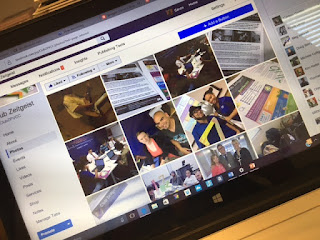Zeitgeist - One description of this term would be "the intellectual and spiritual thinking of the times" - as culture(s) move forward, much of what is good, correct, right and wrong evolves. In my classes, I want students to become sophisticated thinkers capable of divergent thinking and taking in new information that challenges their current paradigms/mental frameworks. When humans get too used to conventional wisdom, convergent thinking and their own comfort zones, they may become entrenched in their established mental frameworks and virtually unable to learn new things (aka old dogs who can't learn new tricks). People tend to think and live as if there are more human universals than actually exist. Education should expand human capabilities so that we can lead the zeitgeist(s)based on wisdom & purposeful choices - not doom us to be followers of the past and what is often obsolete in our quickly changing world.
The Start of Z ...
Club Zeitgeist, or Club Z, had a starting moment when Kat, a student, told me she wanted to start a fashion club on campus. Kat (far right in top photo) is an entrepreneur and leader ... and while I told her I didn't think I could facilitate/sustain a fashion club after she graduated, I knew that the entrepreneurship in her that was directed at fashion could be sustained as a club for anyone with the courage to get outside their comfort zone and work toward some version of "success."
In the entrepreneurship and psychology classes I have taught/teach, a term I have always shared is "zeitgeist." I remind students that some of the business practices of the industrial revolution led to rise of unions, that experts in psychology used to be advocates of lobotomies and that children used to be "seen but not heard" while they now run households under the disabling protection of helicopter parents - the zeitgeist changes, and "ideally" we get wiser and our best practices improve.
A hope I have for my students is that their educational journey goes beyond knowing (course content/information) to thinking (critical and creative) to doing (building 21st century work skills and life skills). Kat had been in my Psychology and Culture class and on the first day of class, it was already apparent that she was of this mindset and capable of going into unknown territory prior to our class experience. After the class was completed, our Z collaboration started over the summer of 2015 and Kat became the Founding President of Club Z in the Fall of 2015. We agreed that we would share our intellectual property with anyone who was interested in any aspect of what we were doing (think of the example of Microsoft Encarta vs. Wikipedia and sharing/protecting intellectual property).
From there, other students, faculty, staff, administrators and community members got involved ... more of the Z story to come ...
A description of Club Z
It's a club, it's initiatives, it's a movement.
And, with regard to the club portion: Club Zeitgeist is a fun, creative and innovative student success club where strivers and thrivers work toward individual and team goals to prepare for intrapreneurship, entrepreneurship, social entrepreneurship and life aspirations.
For more information about Club Z visit:
1) Club Z Facebook Page
https://www.facebook.com/ClubZPVCC/
2) Club Z Webpage at Paradise Valley Community College
https://www.paradisevalley.edu/pv-clubs/club-zeitgeist
3) Attend the Innovation League conference this March in San Francisco for two breakout sessions (March 12-15)
4) Contact Dr. Caron Sada at 602-430-1234 or via C@caronsart.com








